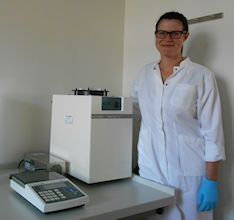 Decellularized tissues represent the ideal natural scaffold for many research applications in tissue science. They also hold great promise as possible transplants for medical applications. Decellularization of tissues can be performed using physical, chemical and enzymatic methods but to achieve good results on the removal of cells and the conservation of the extracellular matrix, a combination of techniques needs to be explored for the different tissue types to find the optimal.
Decellularized tissues represent the ideal natural scaffold for many research applications in tissue science. They also hold great promise as possible transplants for medical applications. Decellularization of tissues can be performed using physical, chemical and enzymatic methods but to achieve good results on the removal of cells and the conservation of the extracellular matrix, a combination of techniques needs to be explored for the different tissue types to find the optimal.
For the dense tissue of tendons, researchers at the University of Leipzig, Germany, recently demonstrated that the application of freeze-thaw cycles prior to treatment with detergents enhances the effectiveness of the decelluralization procedure (Burk et al., 2014).
Dr. Janina Burk’s research group at the Translational Centre for Regenerative Medicine in Leipzig is now working on further improvements of this technique. Using our Planer controlled-rate freezer Kryo 360, they are developing freeze-thaw protocols for standardized decellularization of tendon samples. Preliminary results are promising, showing that the freeze-thaw cycles performed in the controlled-rate freezer are at least as effective as the difficult to control manually performed freezing and thawing. These first results are being published in the degree thesis of biotechnologist Sina Glauche who worked with the group with the Leipzig labs during her studies.
Translational Centre for Regenerative Medicine,
04103 Leipzig http://www.trm.uni-leipzig.de/
